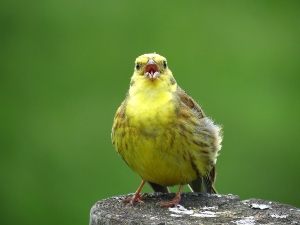
Animals communicate in a variety of ways, dogs bark at each other, cats meow and birds sing to one another. Animals have to use alternative forms of communication because they cannot use language as humans can. In some cases, birds can mimic sounds made by humans and can even whistle just as humans do. If you’ve seen this phenomenon you may be asking yourself ‘how do birds whistle’ this article explores this question
Unlike humans, birds do not have lips to use to whistle but they whistle just the same. To create a whistling sound, birds use their voice chamber called the syrinx to produce a sound similar to a whistle. Birds whistle for a variety of reasons, one would have to do research as to why a specific bird species is whistling to know the reason behind the whistling
Table of Contents
How do birds whistle?
Birds don’t have lips to produce the melodic tunes they make. They also don’t have a voice box as we do, they have more of a voice chamber. A birds voice chamber, or syrinx, is at the bottom of its throat, on the trachea. It is made of a bone shell inside an air pouch in the bird’s breast. Thin tissue connects both sides of the bone shell.
A change in the shape of the syrinx produces the melodic tunes we hear. Birds tighten the tissues to increase the volume. To further extend their ability to make complex tunes, the voice chamber has two sides that can produce sound independently.
Why do birds whistle?
Birds whistle primarily to attract a mate and to outdo a rival bird that is also whistling. This whistle competition is why birds whistling in the morning sometimes cases a ruckas. They also use whistling to warn each other of danger, their whistling can convey useful information such as the kind of predator and the direction it’s attacking from. Baby birds whistle or sing to inform their parents of the need for help or food. Birds can also use whistling to communicate information on food sources, water bodies, nesting grounds, resting grounds, flight information, mates or nesting information
Do birds respond to whistling?
Whistling has meaning to birds, sounds take practice and requires trust from birds. When a bird whistles, it is communicating, not simply making pretty sounds. Some birds will respond to whistling in irritation as it may be taken as a challenge for territory or a mate.
What other sounds do birds make?
Birds make sounds with their wings to warn each other of danger or exchange flight information. They also stomp their feet, clap their beaks, or imitate sounds in their surroundings. Parrots are famous for imitating human sounds which makes it sound as though they are speaking. Birds may also make sounds in pairs by clapping their beaks against each other, flapping their wings in unison, and swimming in groups. All such sounds convey a specific message to birds of the same species and warn other birds to stay away.
Do birds sing because they are happy?
A birds’ singing is usually mistaken for recreational self-expression. That is generally far from the case as a bird’s singing is purposeful, especially when it’s trying to attract an opposite gender bird. Observe the bird species to learn what each sound means before attempting to whistle at them.
Conclusion
In conclusion, a bird uses a voice chamber called a syrinx to produce a sound similar to the whistling sounds that humans produce. These animals not only whistle but respond to whistling from humans as well, however, these birds may be responding to this whistling in irritation. And unlike humans, birds don’t sing when in a happy mood, rather, they sing to attract a mate. Various birds sing for various reasons so the reason your bird is whistling may be unique to the species
If you enjoyed this article then you may also be interested in other bird related articles. Here are some articles that you may be interested in: How long does it take for a bird stuck in a chimney to die?, Why is my bird licking me?, How do birds eat without teeth?, How do birds open sunflower seeds?

